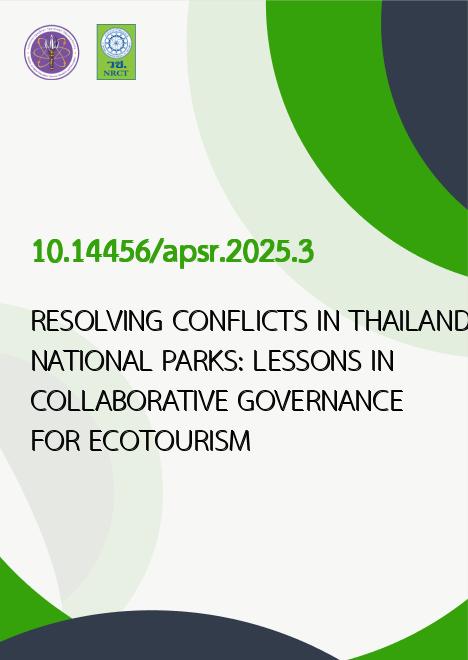
|
RESOLVING CONFLICTS IN THAILAND'S NATIONAL PARKS: LESSONS IN COLLABORATIVE GOVERNANCE FOR ECOTOURISM |
|---|---|
| รหัสดีโอไอ | |
| Creator | Noppon AKAHAT |
| Title | RESOLVING CONFLICTS IN THAILAND'S NATIONAL PARKS: LESSONS IN COLLABORATIVE GOVERNANCE FOR ECOTOURISM |
| Publisher | Asian Political Science Review |
| Publication Year | 2568 |
| Journal Title | Asian Political Science Review |
| Journal Vol. | 9 |
| Journal No. | 1 |
| Page no. | Article 3 |
| Keyword | National Park Areas, Collaborative Governance, Community-Based Ecotourism Management |
| URL Website | https://so01.tci-thaijo.org/index.php/APSR |
| Website title | https://so01.tci-thaijo.org/index.php/APSR/article/view/277000 |
| ISSN | 2730-3624 |
| Abstract | The research aimed to study the lessons learned from operations for resolving conflicts in using national park areas in Thailand with the concept of collaborative governance to promote decentralization in community-based ecotourism management from the case study of Ban Luang, Chom Thong, Chiang Mai. The research findings indicate that the lessons learned from the case study have established collaboration among various stakeholders in the area, including Doi Inthanon National Park, Ban Luang Sub-District Municipality, Royal Agricultural Station Inthanon, Sustainable Development Foundation (Northern Region), Thai Forest Conservation Foundation, and community-based tourism entrepreneurs. This collaboration has continuously addressed conflicts related to managing community land use within the area designated as Doi Inthanon National Park since 2013 under the initiative "Inthanon Family. Then, in part of the analysis of potential conditions leading to the establishment of collaborative governance for promoting decentralization in land management within the conservation areas where community-based ecotourism found four suitable conditions: 1) shaping collaboration among relevant stakeholders; 2) establishing mutual trust-building processes; 3) implementing collaborative decision-making processes; and 4) setting common goals to achieve expected outcomes together, which has led to the creation of suggestions for ways to resolve conflicts in the use of national park areas in Thailand with the concept of collaborative governance to promote decentralization in community-based ecotourism management. |
